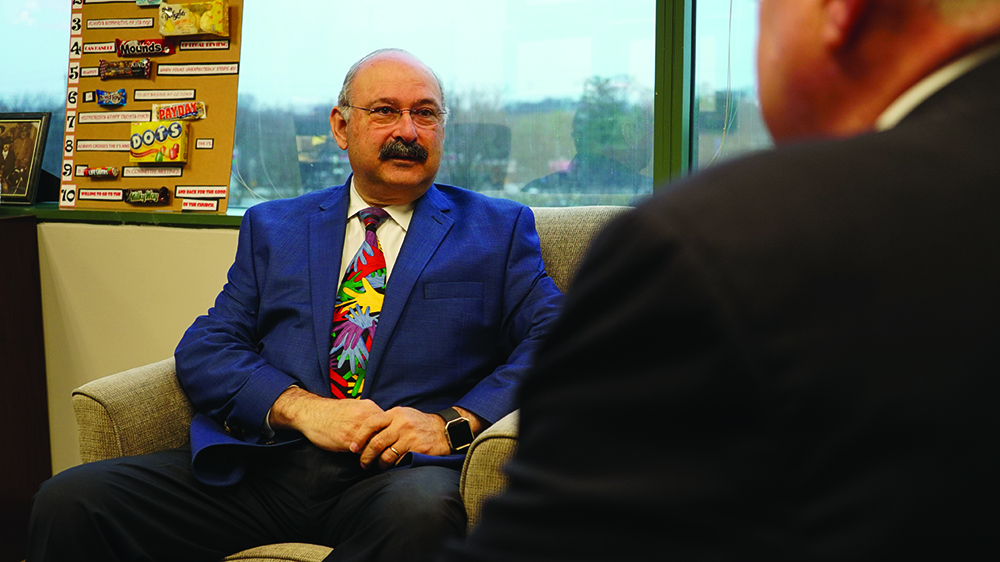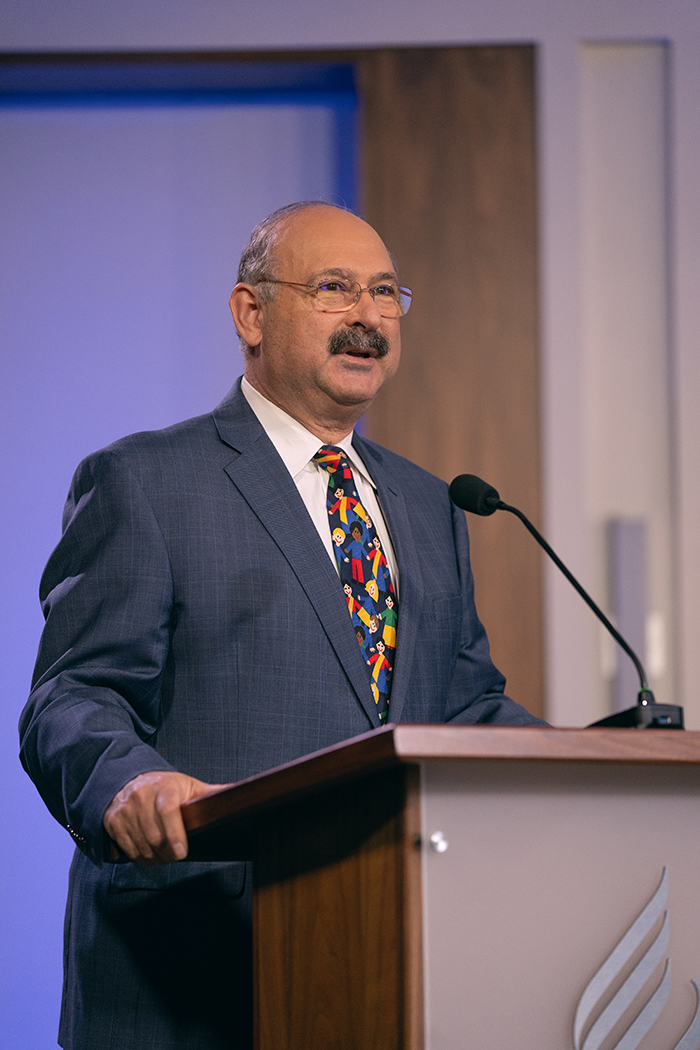
Karnik Doukmetzian, general counsel of the General Conference and the North American Division, and Bill Knott, Adventist World executive editor, discuss how dubious charities with unverifiable projects sometimes take advantage of church members. Photo by Gabriel Begle/Adventist Review Ministries
Adventist World executive editor Bill Knott recently spoke with Karnik Doukmetzian, general counsel of the General Conference and the North American Division, about dubious charities with unverifiable projects that take advantage of church members.
Knott: We’ve recently heard again of a nonprofit organization that for 20 years — under various names but led by the same individual — has been engaged in a series of deceptive financial appeals to church members. The organization claims to distribute Bibles and evangelistic materials in parts of the world that can’t be visited, where no confirming evidence of delivery could ever happen. What’s your reaction as someone charged with watching out for the legal and ethical health of the church?
Doukmetzian: Knowing that the U.S. and Canadian government regulations make it very difficult for Westerners to visit these countries freely or send funds or assistance there, let alone distribute religious literature or Bibles, I immediately start to question the veracity of these projects. How do I verify that the donation I gave because of the touching story I heard in church is actually going for the purpose described?
There are several countries that limit access for people to visit or do ministry work in. How do I know that the funds that I gave for a wonderful project in North Korea, Mauritania, or Brunei — where I know that Adventist work is nonexistent or the church isn’t able to officially have a presence — how do I know that my funds will actually end up there or that the project my funds are to support will actually take place? How do I know that the individuals or the organization telling me all these wonderful stories are legitimate and truthful? Their claims can’t be independently verified.
When someone says, “We’re going to build a school or an orphanage in India with your donations,” and the school goes up, that’s proof my money went to that project and was used for the intended purpose. But if someone says, “I’m going to send a thousand containers of food or Bibles to Mauritania,” how do I verify that those goods or those Bibles actually got to Mauritania?
You and I were both recently contacted by employees of one such organization that has made amazing claims about delivering Bibles and products to a highly restricted area, North Korea. The employees detailed from an internal investigation that moneys weren’t accounted for, and that no confirmation of delivery of goods promised could be obtained. It’s an unusual step when the employees of a ministry actually turn around and say, “Someone, please help us.”
It shows that these well-meaning employees still operate by Christian ethics. Unfortunately, organizations that aren’t recognized denominational organizations and aren’t part of the Seventh-day Adventist structure trade on the church’s name and reputation in order to be able to raise funds from church members. They claim they’re “supporting ministries” or that they are supporting the mission of the church, when, in fact, on many occasions all they’re doing is supporting their own pockets.
How can I know whether a ministry organization asking for my money is reputable?
One of the things donors should check is what watchdog organizations say about these charities. There are a number of ways to check this, including on websites such as CharityWatch.org or GuideStar.org that rate charities. How are these organizations using the funds? Do they satisfy the regulations and tax requirements of U.S. or Canadian governments when they file their tax returns? How do they account for the money they’ve raised and where was it spent?
A key thing that watchdogs such as Charity Navigator or Charity Watch look for is the percentage of funds raised that are actually used for the purpose, programs, or mission of the organization. They also look closely at what percentage is used for overhead, salaries, fundraising, and things like that. The majority of reputable charity or ministry organizations spend between 20 and 35 percent of every dollar donated for overhead-type expenses. Every legitimate organization has legitimate operating expenses. When you see organizations spending upward of 80 or 90 percent or more of the money on their own salaries and overhead, however, you have to ask, “Is my money actually going for a project that I believe in, or is it being used only to perpetuate the organization?” One of the best places for U.S. residents to get that information is from the IRS Form 990 that the IRS requires every nonprofit to file annually. Those reports are available online through such sites as Guidestar, Charity Watch, and Charity Navigator.
There would be a comparable entity in Canada, I expect?
Correct. Canada Revenue Authority has the same requirement, and charities are required to file those forms. In fact, I remember noting an organization in 2020 that raised a little more than $1 million from church members. Its operational expenses were just under $1 million. Of the total, about $200,000 went to the president of the organization as his compensation. If 20 percent of what is raised is going to the president’s salary, let alone the salary of other employees, or rent, or advertising expenses, you know that not much is going to the actual ministry that’s being advertised.
Not many Bibles actually get to North Korea then?
No, and a lot of trusting church members don’t realize how they have been misled. All one has to do is listen to the news to know how oppressive the regime in that country is and to realize how improbable such a task really is to accomplish.

Karnik Doukmetzian, general counsel for the GC and NAD, addresses matters of confidentiality during the NAD 2021 election process. Photo by Pieter Damsteegt
Each church member has a stewardship responsibility before God to use funds wisely. But most of these dubious organizations depend on getting access to believers by preaching at church services or afternoon programs, or offering to supplement what the local church is doing. What are the responsibilities of pastors, elders, and conference leaders before they open their pulpits and give access to what could be scams?
That’s one thing that every church leader needs to monitor constantly. The legitimacy these individuals or organizations get from claiming to be somehow attached to the Adventist Church is their door opener — that’s how they get access to the church. A ministry or charity leader may claim that he or she is a pastor or a retired pastor now leading this effort. They may claim that they’re affiliated somehow with the church or that their project is approved by the official church, or claim that the work they intend to do in some country fulfills the mission of the church because the church can’t officially work there.
That gives them the opening wedge to get into the church. Pastors and leaders are always looking for a heartwarming story from the mission field to encourage their members. When they’re approached under such circumstances, pastors and elders need to be wary about giving up their pulpits without doing the appropriate checks on the organizations claiming to do such good work. The Church Manual is very clear about who should get access to the church pulpit. In North America we’ve had many instances in which individuals with exaggerated, unverifiable claims are allowed to promote their causes during worship services or afternoon youth or mission programs. Unless leaders verify the organization’s credentials and check on the legitimacy of the individuals and their work — see if they have been approved by the local conference — they shouldn’t give access to the pulpit or allow even one dollar to be raised from their church members, no matter how good the pitch sounds.
One of the behaviors frequently reported is that the ministry leader asks for a special offering on the spot. He will urge, “I know you didn’t come here today planning to give to this, but if the Lord touches your heart, this ministry just really needs your support.” And money starts moving. A common tactic your office has documented is that people doing these things frequently say, “Don’t run the offering through your church books and records. Just give it to me, and I’ll take it back to the ministry.” What should a pastor or a local elder do when they’re confronted with that appeal?
If it’s a legitimate ministry, it will have no problems allowing the funds received by the local church to be reported through church channels. For the local congregation as a legitimate charity receiving funds, it’s not against the law to pass the funds on to another legitimate, recognized charity. There’s no problem if there’s nothing to hide. Many times presenters want the money directly so they don’t have to account for it properly, especially if it’s in cash. They’re able to redirect the funds to other purposes, including, sometimes, their own bank accounts. Such organizations shouldn’t be given access to the congregation. They need to satisfy church leadership that they are legitimate by demonstrating, for example, that they are a member of Adventist-laymen’s Services and Industries (ASI). ASI does background checking on organizations before issuing membership. That’s an easy question: “Are you a member of ASI?” I’m not at all saying that if they’re not members of ASI they are somehow illegitimate or fraudulent. But ASI membership is simply another way to check. All donations should go through official church channels so that they can be traced, monitored, and accounted for.
Transparency and accountability are two words that should always be at the forefront of any verification process. The Church Manual gives church leaders counsel in such circumstances. Listen to this: “Pastors and officers shall not grant the privilege of the pulpit to persons for fund-raising who have not been recognized or recommended by the conference. . . . No permission shall be granted to solicit funds either publicly or privately without such recognition. All funds contributed for any cause in response to appeals shall be passed through regular church channels” (p. 139).
Should a ministry soliciting funds be able to demonstrate accountability to external examiners?
Some of these organizations struggle with accountability. Do they go through appropriate audits? Will the funds go through the church books? Funds donated through a local church will be audited by the local conference, and the conference records will be audited by the General Conference Auditing Service. But with independent organizations, who audits their books? That’s actually part of the role of the boards of these organizations — to verify that what’s happening in the ministry or charity is appropriate, and that the goals and mission of the organization are being carried out. Unfortunately, the boards of these small organizations are often made up of friends and family members who don’t pay attention to the accountability aspect of their role. The leader — the president or director — really runs it as a personal kingdom. Money comes and money goes based on one person’s direction.

Karnik Doukmetzian, general counsel for the GC and NAD, addresses matters of confidentiality during the NAD 2021 election process, held virtually this past April. Photo by Pieter Damsteegt
I’m a busy pastor who gets a request to open my pulpit. Is there any central resource I can access to establish the organization’s credibility?
I wish we had a central resource, but at this time we don’t. The main starting point for a pastor is the local conference. Again, the Church Manual is pretty clear on who should have access to our pulpits:
“Under no circumstances should a pastor, elder, or other officer invite strangers or any unauthorized persons to conduct services. Individuals who have been removed from the ministry or who have been removed from membership in other places, or designing persons who have no authority from the church, should not be given access to the pulpit. Those worthy of confidence will be able to identify themselves by producing proper credentials” (p. 120).
Is this individual recognized by the church? Do they have credentials as a denominational employee? Have they been recognized approved or recommended by the conference? If not, it’s best to check with the conference and get conference approval before you grant access to your pulpit or your membership. Don’t allow them to do fundraising in your church without verification.
If a legitimate denominational entity such as It Is Written or Voice of Prophecy or Hope Channel or Breath of Life, is fundraising, that’s fine, because of the interrelationship with those organizations. If Shawn Boonstra requests an opportunity to preach on Sabbath morning and talk with members about the ministry he leads — that’s wonderful. But if an individual says, “Look, I have a project or a supporting ministry, and I’d like to raise money,” tell them, “Don’t come to my church and pass out your brochures and tell your stories and try to collect money unless you are already approved or authorized by the conference.”
Websites now allow us to check many such things quickly. Visit the organization’s website. What do they have on their website? You’ll start to see patterns. Check their newsletters: if those newsletters are identical every month with the same pictures, and the pictures look questionable, you should move carefully, if at all. If the stories they tell are dramatic or unverifiable, you should find another charity to give your funds to. On their website you’ll be able to tell what independent oversight exists for their organization. Check the board membership. You may recognize some names on their board, and you can question those individuals. If it looks like the board is very small, with perhaps only three or four people, and if the individuals all appear to be somehow related or are all employees of the organization, that ought to raise flags. There’s no independence there. What press reports are there regarding this organization? Do your research if you’re going to donate.
From what you’ve shared, church leaders and individual donors have many resources to establish whether a charity or ministry is credible. If you could leave one line in the minds of church leaders and members, what would it be?
Trust, but verify. At its heart the church is built on trusting relationships. We want — we need — to build and retain confidence in the people who lead us, with whom we worship, and who direct mission. Asking good questions is part of good stewardship. If independent ministry organizations can’t supply good answers, put your trust and your money elsewhere.
— This feature interview originally appeared in the July/August 2021 Adventist Journey.
